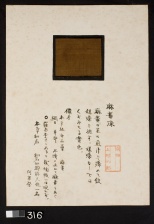Difference between revisions of "Maō (Ephedra sinica) - center (316 C)"
Jump to navigation
Jump to search
(username removed) |
(username removed) |
||
| Line 5: | Line 5: | ||
| 316 | | 316 | ||
|- | |- | ||
| − | ! scope="row"| | + | ! scope="row"|Uemura number / title |
| − | | | + | | ; "Haze-some 25" |
|- | |- | ||
! scope="row"|Folder location | ! scope="row"|Folder location | ||
| Line 41: | Line 41: | ||
| - | | - | ||
|- | |- | ||
| − | ! scope="row"| | + | ! scope="row"|Uemura's notes |
| − | | Without mordanting, the resultant color would be dull yellow. The plant has been taken as medicine since ancient time, and was listed in various medical books, including the | + | | Without mordanting, the resultant color would be dull yellow. The plant has been taken as medicine since ancient time, and was listed in various medical books, including the Shinnhonzoukyo () from 300 BC - 200 AD China; the Bencao Gangmu (accessible through: http://www.i-apple.jp/honzo/) from the late 16th century, China; AD; and Sokyo-honzou (). |
|- | |- | ||
| − | ! scope="row"| | + | ! scope="row"|Uemura's date |
| Kyoto | | Kyoto | ||
|} | |} | ||
| − | [[Category: | + | [[Category:Uemura dye archive]] |
Revision as of 06:20, 24 July 2013
| Museum number | 316 |
|---|---|
| Uemura number / title | ; "Haze-some 25" |
| Folder location | 4th shelf |
| Sample location | center (316 C) |
| Fiber type | silk |
| Color | dark brown |
| Dyestuff (Japanese common name) | 麻黄 : Maō |
| Dyestuff (botanical name) | Ephedra sinica Stapf |
| Plant part | stem / dried (?) |
| Dyestuff extraction | boiled in water |
| Auxiliary agent in dye bath | - |
| Mordant | iron |
| Other auxiliary agent | - |
| Uemura's notes | Without mordanting, the resultant color would be dull yellow. The plant has been taken as medicine since ancient time, and was listed in various medical books, including the Shinnhonzoukyo () from 300 BC - 200 AD China; the Bencao Gangmu (accessible through: http://www.i-apple.jp/honzo/) from the late 16th century, China; AD; and Sokyo-honzou (). |
| Uemura's date | Kyoto |
